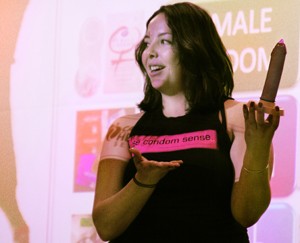Small floating candles dotted the calm water of the UA fountain in front of Old Main. The light barely illuminated Manny, who stood at the fountain’s edge and told the small crowd how he contracted HIV.
With a microphone in hand, Manny told those who came to the World AIDS Day vigil that he thought he was a part of a committed, monogamous relationship; he wasn’t.
His relationship ended, and he grappled with being HIV-positive in the ’90s. Three separate times, Manny’s voice quieted and he stuttered as he held back tears.
“”It wasn’t what I expected,”” he said.
Just past the small vigil, on the fourth floor of the Student Union Memorial Center, the Women’s Resource Center hosted another session of Sex Ed College Style last night, this time to let people know what to expect with HIV and AIDS.
“”A lot of people have misconceptions,”” said Alyssa Padilla, a health and sexuality intern for the Women’s Resource Center. “”While honoring people who have passed away from AIDS, we’re trying to educate people.””
Padilla, a marketing senior, grew up in the predominantly abstinence-based sex education of Arizona. That doesn’t mean she missed out on learning about the potential consequences of an active sex life. Arizona does require schools to provide information and to educate students about sexually transmitted infections and HIV/AIDS. Fortunately for Padilla, she learned the ins and outs of sexually transmitted diseases during her earlier schooling. But she said she didn’t think the education provided about diseases and infections was enough.
“”From my experience, it’s best to teach people how to protect themselves using condoms,”” she said. “”Or abstaining, in general.””
Jai Smith, an undeclared sophomore and a health and sexuality intern for the Women’s Resource Center, went beyond the practices of safe sex and talked to the small group about the transmission and prevention of HIV/AIDS.
Smith outlined the basic necessities needed for a person to contract HIV: an HIV-positive person, a person present to receive the virus, a point of entry (e.g. an open wound), a physical activity to transmit the virus and a fluid that will transmit HIV.
Although the five points seem common knowledge, Smith drove the point home that ignorance still exists.
Before he spoke about the time stages of contracting HIV, Smith offered a misconception that floated around his high school.
“”People were saying that you could have HIV for 10 years before it was even detected,”” he said. “”It’s not true.””
As for the myth that saliva is a fluid that can pass along HIV, it would take nearly a gallon of saliva to potentially give a person HIV, Smith said.
Smith continued to dish out facts about HIV/AIDS in the session that functioned as a general education seminar about the virus. The college style sex education was the information aspect of the three events on campus that pertain to HIV/AIDS. Outside, Monday night, there was the candlelight vigil, and the Women’s Resource Center is partaking in a collaborative effort to provide free HIV testing Wednesday at 3 p.m. in the Center for Student Involvement and Leadership.
After the Women’s Resource Center interns finished their presentation, the audience applauded and a few people hung around to ask more questions.
One of the students who stayed behind was Carrie Hardesty, a health education junior.
Hardesty is a member of the Student Health Advisory Committee, but she said she didn’t have any direct involvement in the AIDS Day events. She, instead, went to the sex education meeting because of her ideals.
“”People need to be educated,”” she said.









